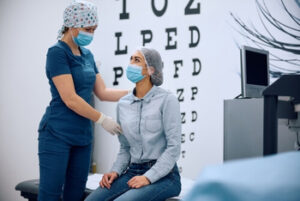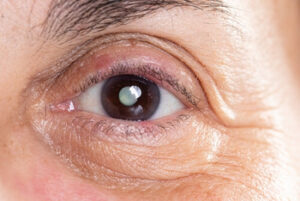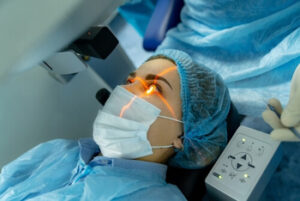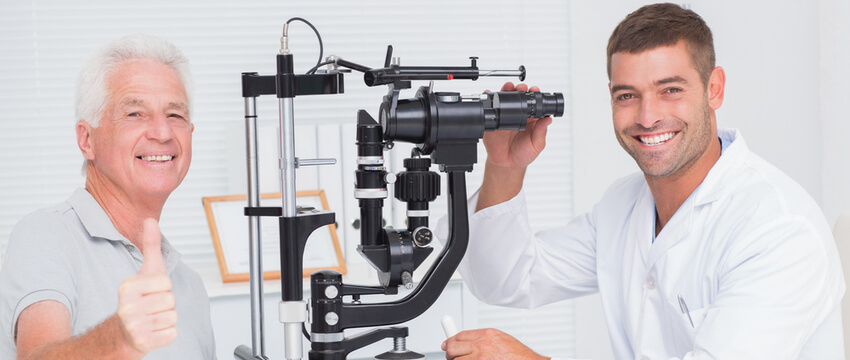Are you exploring your options for clearer vision and wondering which path to take: cataract surgery vs laser eye surgery? You’re not alone.
With so many choices available, understanding the differences between cataract surgery and laser eye surgery is essential to help you feel confident and informed about your decision.
This guide covers everything you need to know, from purpose and procedures to recovery and expected outcomes.
Let’s begin your journey to better eye health by demystifying these two commonly performed surgical options.
What Is Cataract Surgery?
A cataract forms when the eye’s natural lens becomes cloudy, impacting your ability to see well. Although it frequently develops gradually with age, injuries, certain medications, or medical disorders can also be the cause of this illness.
 Purpose Of Cataract Surgery
Purpose Of Cataract Surgery
Cataract surgery removes the hazy lens and replaces it with an artificial lens, resulting in improved vision.
When Is Cataract Surgery Recommended?
Your eye doctor may recommend surgery when cataracts interfere with daily life activities such as reading, driving, or recognising faces.
What Is Laser Eye Surgery?
Laser eye surgery, also known as refractive laser-assisted surgery, corrects vision issues such as short-sightedness (myopia), long-sightedness (hyperopia), and astigmatism. It reshapes the cornea to help light focus properly on the retina.
Purpose Of Laser Eye Surgery
This surgery reduces dependence on contact lenses or glasses, offering a more permanent solution for many vision conditions.
Common Types Of Laser Eye Surgery
Types of laser eye surgery are:
- LASIK (Laser-Assisted in Situ Keratomileusis)
- PRK (Photorefractive Keratectomy)
- SMILE (Small Incision Lenticule Extraction)
The Procedure: Step-By-Step Comparison
Understanding how each type of eye surgery works can help you make a more informed decision.
Here’s a streamlined look at cataract surgery vs laser eye surgery:
Cataract Surgery
The focus of cataract surgery is to get rid of the cloudy natural lens and replace it with a clear intraocular lens (IOL):
- To numb the eye, anaesthetic eye drops are used.
- Precise incisions are made, usually self-sealing.
- Ultrasound energy breaks up the cloudy lens.
- The lens is completely removed.
- A custom artificial lens is inserted.
- No stitches are typically required, and a shield may be placed over the eye.
Laser Eye Surgery
Laser eye surgery adjusts the shape of the cornea to correct vision (no lens replacement is involved):
- The eye is numbed with anaesthetic drops.
- In LASIK, a femtosecond laser makes a thin flap in the cornea.
- The corneal tissue gets reshaped with an excimer laser to fix vision.
- The flap is gently repositioned, sealing naturally.
Artificial Lens Options In Cataract Surgery
Choosing the right IOL is crucial in cataract surgery, as it impacts your vision post-surgery.
Here are the main types of IOLs:
- Standard Monofocal Lens: The monofocal lens is commonly used in traditional cataract surgery to provide clear vision at one distance, either near or far. Glasses may still be needed for other distances.
- Multifocal Lens: A multifocal lens allows for clear vision at multiple distances, reducing the need for glasses for both near and far vision.
- Toric Lens: The toric lens corrects astigmatism, offering a sharper vision for those with corneal irregularities.
- Extended Depth Of Focus (EDOF) Lens: EDOF lenses offer a continuous range of vision, enhancing clarity at distance and intermediate ranges. They are ideal for activities like reading a computer screen, with fewer visual disturbances than multifocal lenses.
Cataract Surgery Recovery VS Laser Eye Surgery Recovery
Understanding the recovery process will help you plan for aftercare and ensure a smooth healing journey.
Here’s a comparison of what to expect for each surgery:
Cataract Surgery Recovery
After cataract surgery, recovery takes a few days to weeks, for the most part.
Here’s what you can expect:
- Vision improvement happens gradually over time.
- It’s important to avoid rubbing your eyes and refrain from strenuous activities during the initial healing period.
- Follow-up visits with your eye specialist are necessary to keep track of your progress and ensure the eye is healing well.
Laser Eye Surgery Recovery
Laser eye surgery has a faster recovery; many people return to routine activities within a day or two.
Here’s what to expect:
- Blurry vision may occur initially, but it typically improves in the days following surgery.
- Eye drops are prescribed to protect against infection and address eye dryness.
Risks And Considerations
Both cataract surgery and laser eye surgery are generally accurate, but it’s important to be aware of potential risks.
Here’s a breakdown of what to consider for each procedure:
Cataract Surgery Risks
While cataract surgery is highly successful, possible risks include:
- Infection or inflammation at the corneal incision site, though this is rare and manageable.
- Glare or halos around lights, particularly at night, as the eye adjusts.
- A minor risk of posterior capsule opacification (cloudiness behind the lens), which can be easily treated with a follow-up laser procedure.
Laser Eye Surgery Risks
Laser eye surgery also has its risks, though they are typically minimal:
- Dry eyes can occur temporarily but usually improve with time and prescribed eye drops.
- There’s a chance of undercorrection or overcorrection, meaning vision may not fully meet expectations, but this can often be corrected with additional treatment.
- Flap complications (in LASIK) can happen and may require further intervention.
Frequently Asked Questions
Will vision be perfect after laser eye surgery?
Vision improves significantly for most patients, but individual results vary. Your surgeon will discuss realistic outcomes with you.
Can I still wear contact lenses after manual cataract surgery?
After cataract surgery, it’s typically best to avoid wearing contact lenses until your eye has fully healed.
Based on your healing progress, your surgeon will guide you on when to return to wearing them.
Do I need to stop using certain medications before surgery?
Your surgeon may advise you to stop taking certain medications, especially blood thinners, before both cataract and laser eye surgery.
Discuss all medications and supplements you’re taking during your pre-surgery consultation.
Conclusion

Whether you’re looking for cataract removal or refractive laser treatment, both offer modern, effective surgical options, advanced technology, and highly trained eye doctors who will guide you every step of the way.
Choosing between laser surgery and cataract surgery isn’t about which is better, but which is right for you.
With your unique medical history, lifestyle goals, and vision needs in mind, your surgeon will help tailor a plan that supports your eye health now and into the future.
Whether you’re considering cataract surgery or laser eye surgery, our expert team is here in Melbourne to guide you through every step of the process. With years of experience and advanced technology, we’ll help you achieve clearer vision and better eye health.
Contact Dr Anton Van Heerden today at 03 9000 0389 to schedule a consultation and find out which procedure is right for you. Visit our cataract eye clinic near Melbourne to discover how we can help improve your eyesight and enhance your quality of life. Let’s discuss how we can help improve your eyesight and enhance your quality of life.
Note: Any surgical or invasive procedure carries risks. Before proceeding, you should seek a second opinion from an appropriately qualified health practitioner.
Sources
Bedinghaus T. What Are Cataracts? [Internet]. Verywell Health. 2023 [cited 2025 Apr 30]. Available from: https://www.verywellhealth.com/what-are-cataracts-3422067
Healthdirect Australia. Laser Eye Surgery [Internet]. Healthdirect. 2024 [cited 2025 Apr 30]. Available from: https://www.healthdirect.gov.au/laser-eye-surgery
Boyd K. IOL Implants: Lens Replacement After Cataracts [Internet]. Alba-Campomanes A G de, editor. American Academy of Ophthalmology. 2024 [cited 2025 Apr 30]. Available from: https://www.aao.org/eye-health/diseases/cataracts-iol-implants
Landwehr J. Can You Rub Your Eyes Too Much—And Is It Dangerous for Your Eye Health? [Internet]. Health. 2024 [cited 2025 Apr 30]. Available from: https://www.health.com/rubbing-eyes-too-much-dangerous-8430871



 Purpose Of Cataract Surgery
Purpose Of Cataract Surgery




Recent Comments